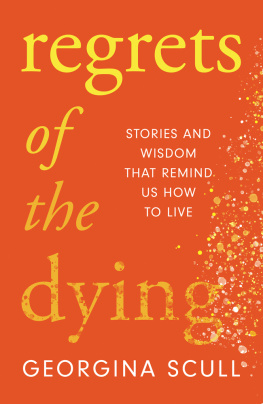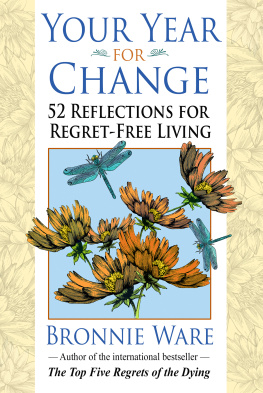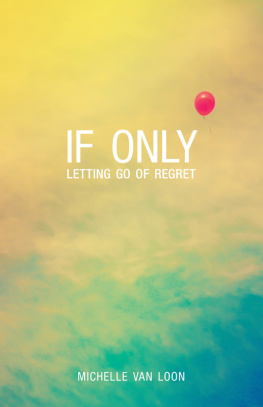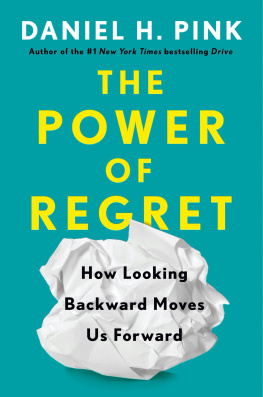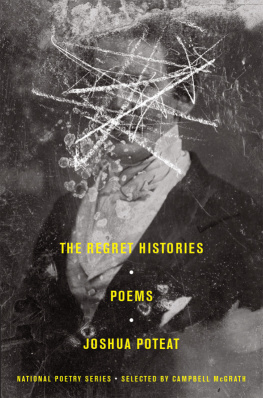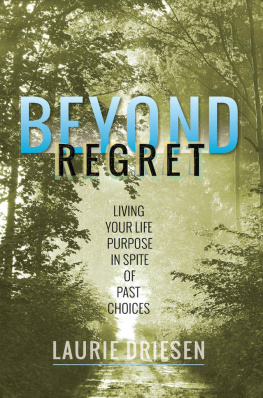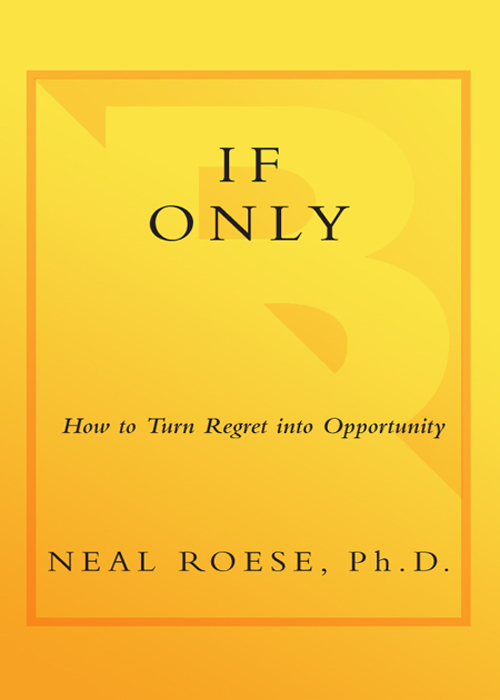
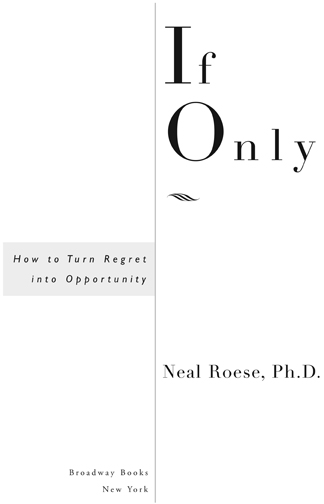
Contents

For Emma
and Annie

Acknowledgments

With a book called If Only, you can be sure that I am well aware of the many ways the project might have gone differently, were it not for the contributions of several key individuals. Indeed, this book project would probably not have begun at all if not for my agent, Eileen Cope, of Lowenstein-Yost Associates. Over the years I had kicked around the idea of writing a book on counterfactual thinking, but Id never quite gotten serious about it until Eileen contacted me out of the blue and suggested it. Eileen discovered me by way of a research news website that Ive maintained for nearly a decade (counterfactual.net) and urged me to write the book sooner rather than later. Eileen was instrumental in helping me assemble a sellable proposal. Kris Puopolo has been my editor at Broadway Books; and again, the book probably would not have happened without her. She gave the early drafts an exceptionally sharp review, pushing me to make important changes that improved and clarified the final manuscript tremendously. From the start, Kris keenly understood the essence of my ideas, on some occasions better than I myself did. I feel enormously lucky to have had the good fortune of working with Kris.
Throughout the writing process, I have deeply appreciated the enthusiasm and support of my wife, Karen. She is the only person to have waded through the entirety of the overly long first draft. She then not only corrected the silly mistakes but also suggested many a new interesting avenue to explore in subsequent writing. Although my daughters, Emma and Annie, were too young to quite realize what it was that Daddy was doing on the computer for so many months, their joyous spirit and energy pervade this book. Indeed, the book is dedicated to them, and I look forward to a time in the future when they can read it for themselves and tell me how I might have written it better.
I wrote this book during my first year on the faculty at the University of Illinois. During that time of adjustment, it was a continuing delight to work among such an extraordinarily talented group of scientists. I especially want to thank professors Ed Diener and Justin Kruger for their incisive discussions of recent research findings.
I am grateful to the following scholars who answered my questions about their own and others research: Rene Baillargeon, John Bargh, Ruth Byrne, Adam Galinsky, Dan Gilbert, Paul Harris, Sheena Iyengar, Ned Lebow, Keith Markman, Michael Morris, Dave Piercey, Barry Schwartz, Jeff Sherman, Phil Tetlock, Kate White, Carsten Wrosch, Maia Young, and Marcel Zeelenberg. I very much appreciate the feedback on specific chapters offered by the following individuals: Galen Bodenhausen, Larry Sanna, and Steve Wiseman. The following people lent me various bits of additional assistance during my time of writing: Richard Corley, Kemberly Crummet, Beth Haymaker, Jeff Kuban, Vuk Vuksanovic, and Michelle Zimmerman. And from the very beginning, I have treasured the kind words of support offered by my sister, Tanis, uncle Gary, and mom, Geraldine.
Finally, I would like to thank Jim Olson, my academic mentor, longtime collaborator, and friend. Without his kind encouragement and keen insight over many years of joint projects, this book could not have been written.
Introduction

Take an ordinary coin and flip it. As it arcs through the air, it has two possible futures, two potential outcomes. Heads or tails. It lands and one side is facing up, the other down. At the moment of landing, those two potential outcomes vanish to be replaced by a single factual outcome. This time, heads is up. Heads is the factual outcome. It is what is: factuality, actuality, reality. Tails is the outcome that did not occur. But it could have occurred. It might have been. The coin is fair, and so there was an even chance that tails might have come up. But thats not what happened. Tails is a counterfactual outcome.
Counterfactual means, literally, contrary to the facts. Counterfactual thoughts are thoughts of what might have been, of what could have happened had some detail, or action, or outcome been different in the past. Whenever we say if only or almost, or use words like could, would, or should, we may be expressing a counterfactual thought: If only I were taller... I almost won that hand... I could have been a contender... I would have caught that ball, if not for the sun in my eyes.
You might think that counterfactuals are examples of mere fantasy, of our brain engaged in unproductive navel-gazing and time-wasting. Maybe you agree with the main character in Norman Rushs novel, Mating, who muses to herself: Nothing is more profitless than going back over what interventions might have changed the shape of things.... I want to scream at myself when I do that. For years psychologists agreed with this sentiment, that counterfactual thinking is at best pointless, at worst an impediment to sound reasoning and wise decision-making. New research tells a different story.
If only thinking is good for you. Counterfactual thinking, along with regret, its emotional offspring, plays a vital role in learning, insight, and improvement. From counterfactuals comes recognition of possibilities, out of regret comes hope for the future, and the essence of human cognition is a set of interlocking mechanisms designed to identify, understand, and fix the problems, both big and small, that appear constantly along the road of life. Regret feels bad, but it is utterly essential for healthy living. Understanding and harnessing your own regrets can make you better.
The positive value of regret is emblematic of a recent revolution in how scientists view emotions. It was once widely believed that emotions are the enemy of rational thought and that to be successful you must stifle your feelings. Many self-help books teach you to avoid negativity. But it turns out that emotions in general, and negative emotions in particular, are a crucial component of rational thought. They are essential to effective performance, whatever the task may be. Regret is an example of a negative emotion that spurs people to problem-solving and personal betterment. This books explains why and shows how you can harness regret for your own benefit.
Along the way, well gain a new appreciation for the magnificent power of the human brain. Well see how a silent set of protective brain mechanismswhat might be called a psychological immune systemstand ready to manage regret and console us after misfortune. Most people are unaware of how powerfully these brain mechanisms work. This is a shame, for it can be an enormously liberating feeling to realize that no matter which way you decide things, your own brain stands ready to reconcile you in the end to that decision.

There are many kinds of thoughts, and this book is about just one of them, the counterfactual thought. Now, thoughts are tough things to nail down: they are fleeting, they are ephemeral, they lack concrete form. Indeed, if you were a scientific psychologist in the first half of the twentieth century, you would have thought it ludicrous to even consider measuring something so insubstantial as thought. Yet after about 1950, a curious change overcame scientific psychology, something called the cognitive revolution, in which more and more psychologists realized that it was not only possible to measure thought, but utterly essential to measure thought, as thought is nearly synonymous with human nature.
Next page

